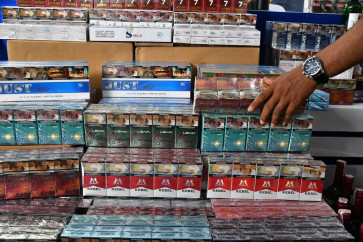Popular Reads
Top Results
Can't find what you're looking for?
View all search resultsPopular Reads
Top Results
Can't find what you're looking for?
View all search resultsAnalysis: Govt drops excise hikes, offers amnesty to illegal cigarette makers
Change text size
Gift Premium Articles
to Anyone
T
he government has walked back its previous plan to raise the tobacco excise tax, a policy that had been a central pillar of its earlier crackdown on illegal cigarettes. Under the former administration, the approach was largely punitive, marked by annual excise hikes, aggressive “Gempur Rokok Ilegal” raids on small retailers, and stiff penalties for anyone caught selling untaxed products. In a major policy shift, Finance Minister Purbaya Yudhi Sadewa has now announced that the government will instead offer amnesty to illegal cigarette producers, aiming to incentivize them to register, fulfill their tax obligations, and transition into the formal, regulated market.
Tobacco has traditionally made up the bulk of Indonesia’s excise revenue, reaching as high as 96.2 percent in in 2022 and 2023. Beyond its fiscal contribution, the tobacco industry also plays a major role in the national economy, employing millions across farming, manufacturing and distribution. This economic weight forms part of the rationale behind the government’s recent policy shift.
Purbaya explained that the government’s new approach reflects a pragmatic response to current economic conditions, marked by weak purchasing power and sluggish job creation. He noted that while annual excise hikes were designed to gradually curb tobacco consumption by making cigarettes less affordable, the policy has strained the industry without meaningfully reducing demand. Instead, it has pushed many small producers into the underground, unregulated market.
With tobacco taxes rising almost every year since 2014, illegal cigarettes continue to flood the market. Rather than achieving the intended reduction in consumption, the price gap between taxed and untaxed products has widened, making illicit trade more attractive for both sellers and consumers. The newly introduced amnesty program is therefore meant to address the root of this problem by encouraging unregistered manufacturers to join the formal economy, where their production can be monitored, regulated and taxed more effectively.
Purbaya has also expressed his concern that the tobacco policy has been viewed solely from the public health lens. The tobacco sector, he argued, remains a critical source of employment for millions of Indonesians, spanning farmers, factory workers and small retailers. In a time of weak job growth, he warned tightening regulations on this industry would lead to widespread job losses, especially during this period when every sector would struggle to absorb labor.
The government’s new stance marks a notable departure from the previous “Gempur Rokok Ilegal” campaign, a nationwide enforcement drive that was launched all the way back in 2017. The initiative sought to suppress the circulation of untaxed cigarettes through raids on small retailers, markets and distributors, often accompanied by public awareness campaigns and visible displays of confiscated goods. While it generated headlines and underscored the government’s determination to safeguard state revenue, most enforcement actions focused on small traders rather than dismantling the illicit production networks feeding the market.
Over time, this campaign became increasingly more criticized as being only symbolic with little structural impact. Despite millions of cigarette sticks being seized each year, unlicensed factories continued to operate, adapting quickly to enforcement pressures. This disconnect between enforcement intensity and policy outcome ultimately strengthened the case for a different approach, one centered on formalization and compliance rather than punishment.



















